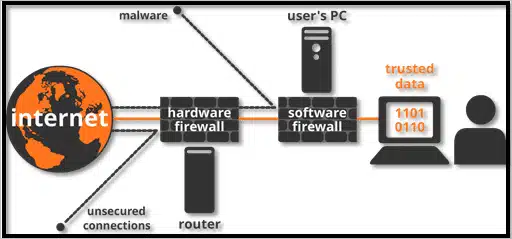Firewalls have been around for a long time. Despite not being a totally new innovation, these security tools still have an important role to play within an organization’s overall network security framework.
For those who don’t have much knowledge about firewalls beyond the fact you’ve heard the name a million times, lets’ do a brief explanation of the general concept before digging into more specific details.
Firewalls are one of the most important lines of defence against cyber threats. Even though firewalls have been around for decades, they are still widely used by essentially every organization due to their continued effectiveness at certain tasks. These are some of the key functions of firewalls:
- Protect against threats regardless of source – There are all kinds of risks that can affect enterprise networks in today’s world. Firewalls are sort of the first line of defense in stopping these attacks in their tracks. No matter if a threat originates from outside an organization or within, a firewall will increase the likelihood of it being blocked and isolated before it can cause any damage.
- Logging and auditing – While stopping attacks is certainly one of the most important parts of a firewall’s functionality, it’s not all the matters. Firewalls are also critical for the logging of network events, which will then be essential information for auditing behavior. This information can be used to bolster security, as well as serve as important data in the event of a breach.
- Send alerts when necessary – The sooner you know about a potential threat, the better your chances of containing and killing it before it causes serious harm. As one of the first lines of defense against threats, alerts from a firewall can help block attacks from reaching their intended targets.
As you can see, there are some big reasons why firewalls are still a relevant piece of technology after so many years. But they haven’t stayed totally the same overall this time. Multi-zone network firewalls are one of the new iterations that is providing value and security in totally new ways.
What Makes Multi-Zone Network Firewalls Different?
Tools and technologies need to evolve and adapt in order to stay current with the times. This is especially true in the world of cybersecurity, where the nature of threats is constantly in a state of flux. So, what makes a multi-zone network firewall different from its predecessors? These are a few things that set them apart:
- As the name implies, multi-zone network firewalls separates the network security architecture into different “zones.” There are a few reasons for doing this. First, by dividing the network into zones, it’s possible for a firewall to group endpoints and traffic based on specific risk profiles. Each zone will contain traffic of a similar risk profile, which will then need to be analyzed and filtered before it can interact with other zones. This can reduce the likelihood of a high-risk connection slipping past a firewall.
- Smarter firewalls are able to investigate packets at a deeper level. A multi-zone network firewall should be able to create a more streamlined set of rules that allow for more accurate and comprehensive filtering, regardless of policy factors.
- By narrowing how communication happens across the various firewall zones, it’s possible to create a far more controlled network environment. When assets from different zones can only utilize certain applications when crossing zone thresholds, it makes a far more predictable and secure ecosystem.
- Creating zones limits the need for formulating a huge list of different policies and protocols for different types of assets and connections. By grouping similar types together, only one rule or policy can be used for all constituents of a zone.
Beyond the points mentioned, a multi-zone network firewall can also be a great addition to your security stack due to its often managed nature. Opting for managed security services might seem risky at first, but they often offer much better overall security. And beyond that, it’s typically possible to bundle managed security tools when working with a single provider to gain better cost synergies.
These are some of the main components of multi-zone network firewalls and how they relate to your enterprise’s security. Implementing one of these multi-zone network firewalls, especially with a top-tier provider, can greatly improve your organization’s security posture.






